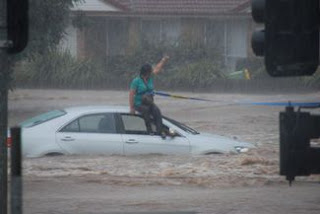Friday, 11 March 2011
Did ‘Supermoon’ Cause 8.9 Earthquake in Japan?
The 2005 Indonesian tsunami hit two weeks before the supermoon and for the 2011 supermoon, which is suppose to occur March 19, the moon won’t just be at its closest approach to Earth in its elliptical orbit, enthusiasts say, it will be closer to Earth than it has been in 18 years.
Paul Walker, senior meteorologist for AccuWeather Inc., said it’s unlikely the supermoon played a role in today’s earthquake.
“I don’t think you can attribute it to being a full moon, which is still eight days away,” Walker said. “These moon events can cause the tides to run higher than normal, but I’ve not heard of any correlation between them and extreme weather events.”
Where Did ‘Supermoon’ Come From?
AccuWeather blogger Mark Paquette said he thinks the phrase “supermoon” originated on the website of astrologer Richard Nolle and spread to astronomers online.
In a blog post earlier this month, Paquette said a new or full moon at 90 percent or more of its closest perigee qualifies as a “supermoon.” The moon’s orbit around us is slightly elliptical, and when the moon is at the near point, it is known as a lunar perigee.
Next weekend’s full moon won’t just be a supermoon but an extreme supermoon, he said, because the moon will be almost precisely at its closest distance to Earth.
According to “new age” forecasts, he said, the supermoon brings strong earthquakes, storms or unusual climate patterns.
“There were supermoons in 1955, 1974, 1992 and 2005,” he wrote. “These years had their share of extreme weather and other natural events. Is the Super Moon and these natural occurrences a coincidence?“Some would say yes; some would say no. I’m not here to pick sides and say I’m a believer or non-believer in subjects like this, but as a scientist I know enough to ask questions and try to find answers.”
Astronomer: No Scientific Reason to Expect Extreme Weather
Paquette told ABCNews.com that he wants to remain “neutral” on the topic but said, “I do think it’s possible that it could bring earthquakes, volcanic eruptions or anything weather-related as well.”
But NASA astronomer Dave Williams said there’s no reason to believe that anything out of the ordinary — aside from an especially big and bright full moon — will take place next week.
“There’s nothing really special about this,” he said.
For starters, although the moon will be closer than it’s been for 18 or 19 years, it will only be one or two percent closer.
“It’s nothing you could notice unless you made really accurate measurements,” he said. “It’s a few thousand miles closer, but as far as the moon’s orbit is considered, that’s nothing.”
Moon Will Be as Big as It Gets
The moon orbits the Earth every 29 1/2 days, so it reaches perigee more than once a month. The orbit of the moon changes slightly over time, so the distance between Earth and the moon also changes — but only slightly, Williams said.
On March 19, it will probably be only about half a percent closer than it ever is every 18 years, he said, which is a “very, very small amount.”
And though the gravitational effect of the moon causes the tides (when the moon is closer, the tides are slightly larger), he said there’s “no scientific reason whatsoever” to expect that this supermoon will result in floods or other extreme conditions.
But, Williams said, on the night of March 19, you will want to peek up at the sky.
“Because it’s a full moon at its closest approach, it’s going to be big and really bright. It should be noticeably brighter than a normal full moon. I would suggest that you take the opportunity and go out at night,” he said. “This is the biggest full moon that you will ever see. You will see this moon again, but this is as big as it gets
MY PRIDE DID YOU KNOW THAT.......
India is one of the oldest civilizations in the world, spanning a period of more than 4000 years, and witnessing the fusion of several customs and traditions, which are reflective of the rich culture and heritage of the Country.
The history of the nation gives a glimpse into the magnanimity of its evolution - from a Country reeling under colonialism, to one of the leading economies in the global scenario within a span of fifty years. More than anything, the nationalistic fervour of the people is the contributing force behind the culmination of such a development. This transformation of the nation instills a sense of national pride in the heart of every Indian within the Country and abroad, and this section is a modest attempt at keeping its flame alive.
Sanskrit is considered as the mother of all higher languages.
This is because it is the most precise and therefore the suitable language for computer software (a report in Forbes magazine, July 1987)



No comments:
Post a Comment